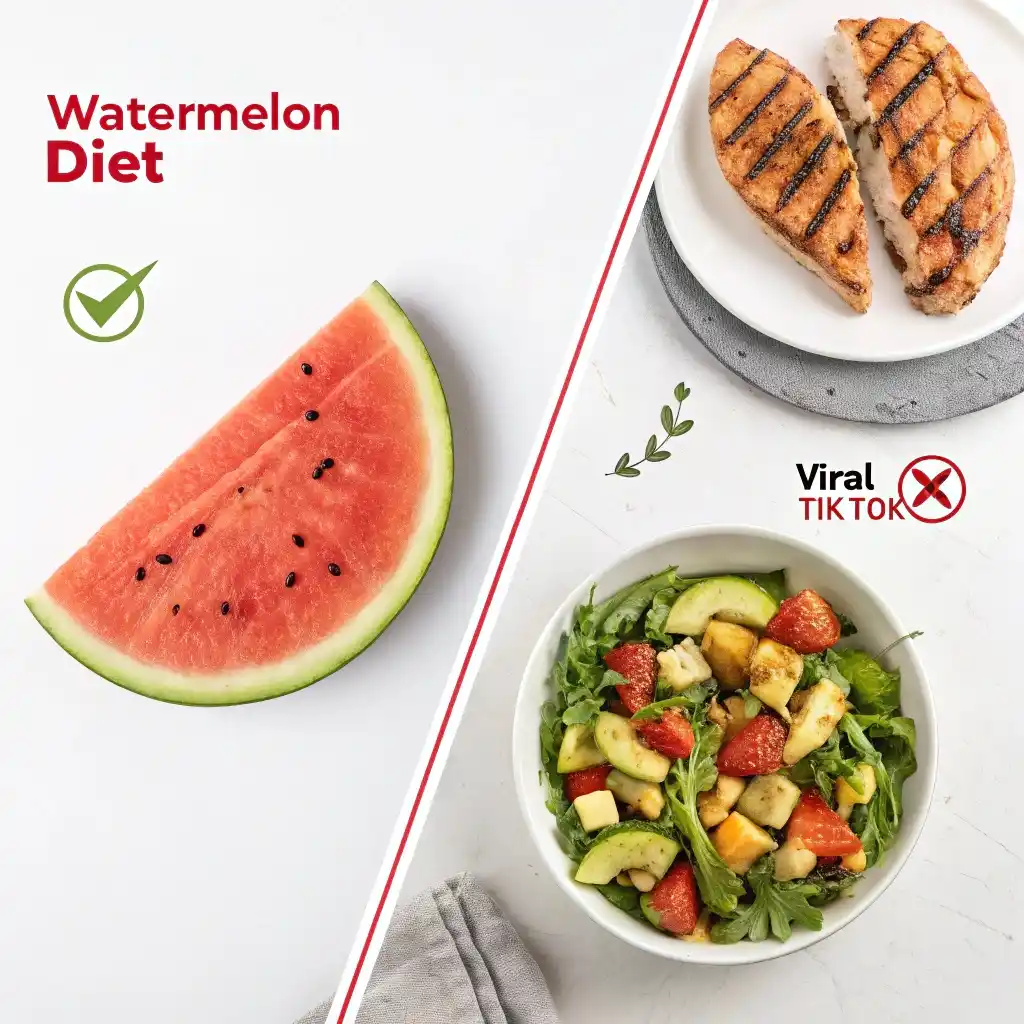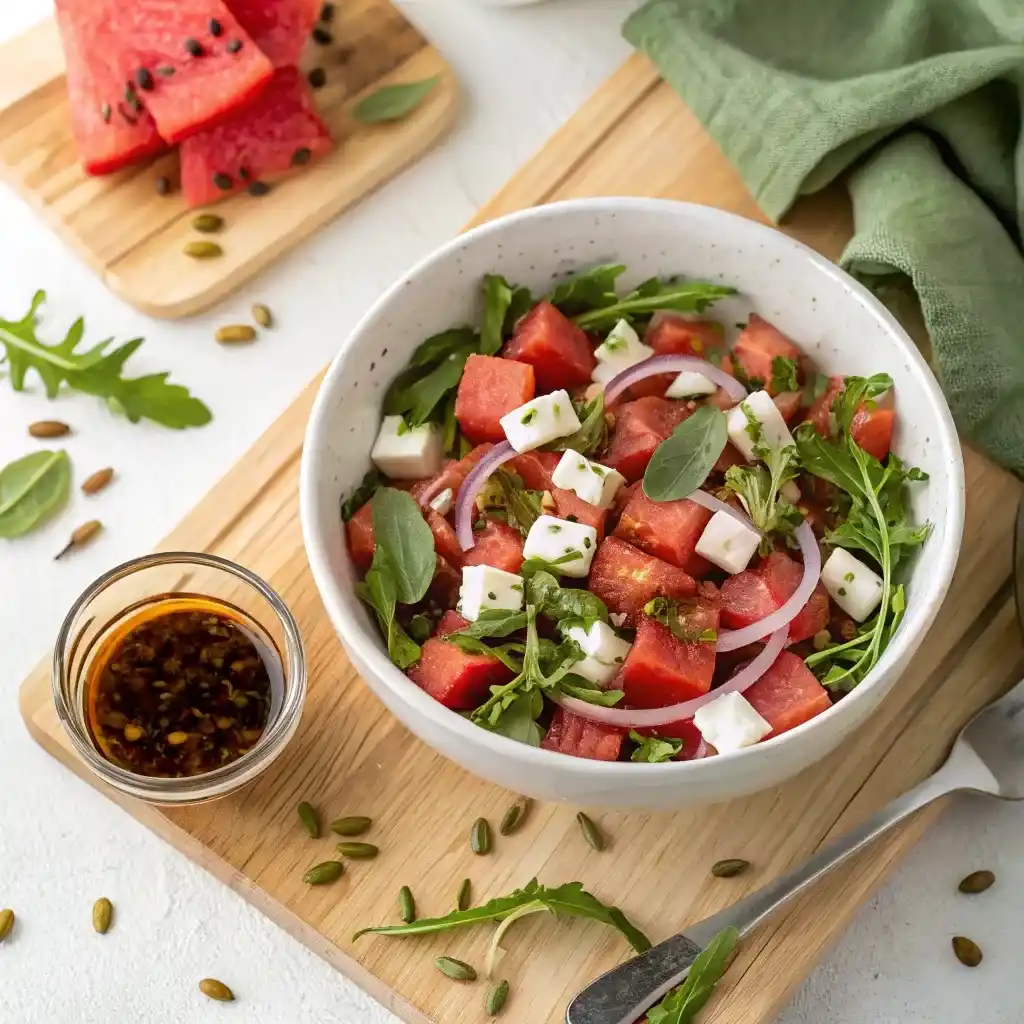The Latest Diet Trend Has Me Concerned
As a registered dietitian who’s spent over a decade helping people achieve sustainable weight loss, I’ve seen countless fad diets come and go. But the latest viral sensation – the watermelon diet – has me particularly concerned. With millions of views on TikTok and countless creators documenting dramatic weight loss results, this trend is spreading faster than wildfire across social media platforms.
Here’s the thing: while watermelon is absolutely a nutritious summer fruit that deserves a place in your healthy eating plan, turning it into a restrictive mono-diet is not only ineffective for long-term weight management – it’s potentially dangerous. In this comprehensive guide, I’ll break down exactly why the watermelon diet trend is problematic from a nutritional standpoint, and more importantly, I’ll share four delicious, science-backed watermelon recipes that can actually support your health goals without putting your body at risk.
Ready to separate fact from fiction? Let’s dive in.
Looking for more evidence-based nutrition content? Check out my comprehensive guide on viral food trends and discover which trendy foods actually deserve a place in your healthy eating plan.
What Exactly Is the Watermelon Diet?
The watermelon diet trend is a restrictive eating plan that involves consuming nothing but watermelon for anywhere from three to seven consecutive days. Proponents of this watermelon detox claim it can lead to rapid weight loss, improved hydration, and body “cleansing” – all while enjoying one of summer’s most refreshing fruits.
The TikTok Claims
Scroll through TikTok and you’ll find creators making bold claims about their watermelon diet experiences:
- “I lost 8 pounds in 5 days!”
- “My skin is glowing and I feel so detoxed”
- “This watermelon weight loss hack changed everything”
- “The easiest way to reset your metabolism”
These videos often show dramatic before-and-after scale readings, with creators consuming 12-14 cups of diced watermelon daily – equivalent to 6-7 cups of water just from the fruit alone. The visual appeal is undeniable: juicy, colorful watermelon chunks paired with excited testimonials about rapid results.
For context on other questionable weight loss trends, see my analysis of the pink salt weight loss recipe and why these viral “hacks” often do more harm than good.
The Promised Benefits
According to watermelon diet enthusiasts, this approach offers several supposed advantages:
Rapid Weight Loss: Many claim to lose 5-10 pounds within the first week Natural Detoxification: The high water content is said to “flush toxins” from the body Improved Hydration: With watermelon being 92% water, followers believe they’re optimizing their fluid intake Simplified Eating: No meal planning, calorie counting, or complex recipes required Natural Sugars: Supporters argue that fruit sugars are “healthier” than processed alternatives
The Reality Check
Here’s what’s actually happening during a watermelon diet: you’re creating an extreme caloric deficit while flooding your system with water and natural sugars. Most people consume between 800-1200 calories daily on this plan – well below the minimum recommended intake for healthy adults. While this will certainly result in rapid scale changes, the weight loss you’re seeing isn’t the fat loss you’re hoping for.
The Science-Based Problems With the Watermelon Diet
As appealing as quick results might sound, the watermelon diet presents several serious nutritional and metabolic concerns that every health-conscious person should understand.
Severe Nutritional Deficiencies
Protein Deficiency Crisis: Watermelon contains virtually no protein – less than 1 gram per cup. This macronutrient is essential for maintaining muscle mass, supporting immune function, and keeping you satiated. When you eliminate protein for multiple days, your body begins breaking down muscle tissue to access the amino acids it desperately needs. Research published in the American Journal of Clinical Nutrition shows that adequate protein intake (0.8-1.2g per kg of body weight) is crucial for preserving lean body mass during weight loss.
Missing Essential Fats: Healthy fats are completely absent from watermelon, yet they’re vital for hormone production, nutrient absorption, and brain function. Your body cannot produce essential fatty acids on its own – they must come from food sources. A diet devoid of fats can lead to hormonal imbalances and impaired cognitive function within just a few days.
Fiber Shortage: While watermelon does contain some fiber, it’s nowhere near the 25-35 grams daily recommended for optimal digestive health. Adequate fiber intake supports gut microbiome diversity, helps regulate blood sugar, and promotes feelings of fullness – all crucial components of sustainable weight management.
Muscle Loss vs. Fat Loss: The Uncomfortable Truth
The rapid weight loss experienced on the watermelon diet is primarily water weight and muscle loss, not fat reduction. When you drastically reduce calories and eliminate protein, your body enters a catabolic state where it breaks down muscle tissue for energy. Studies show that without adequate protein intake, up to 25% of weight lost during extreme caloric restriction can come from muscle mass.
This muscle loss is particularly problematic because muscle tissue is metabolically active – it burns calories even at rest. When you lose muscle, your metabolic rate decreases, making it easier to regain weight once you return to normal eating patterns. This creates the classic yo-yo diet cycle that leaves people heavier than when they started.
Blood Sugar Rollercoaster
Watermelon has a glycemic index of 72, meaning it causes rapid spikes in blood glucose levels. When you’re consuming large quantities throughout the day without protein or fat to slow absorption, you’re creating a constant cycle of blood sugar spikes and crashes. This pattern leads to:
- Energy fluctuations and fatigue
- Increased hunger and cravings
- Mood swings and irritability
- Potential insulin resistance over time
Electrolyte Imbalance Dangers
While watermelon is high in potassium (170mg per cup), it’s extremely low in sodium. This imbalance, combined with the excessive water intake, can lead to hyponatremia – a dangerous condition where blood sodium levels become too diluted. Symptoms include headaches, nausea, confusion, and in severe cases, seizures.
The Rebound Effect
Perhaps most concerning is what happens after the watermelon diet ends. The extreme restriction inevitably leads to rebound eating, where people consume significantly more calories than usual as their body attempts to restore balance. Research consistently shows that restrictive diets trigger biological mechanisms that increase hunger hormones and decrease satiety signals, making weight regain almost inevitable.
What Nutrition Experts Are Really Saying
The concerns I’ve outlined aren’t just theoretical – they’re backed by leading nutrition professionals who’ve studied the effects of restrictive eating patterns.
Dr. Mark Hyman’s Warning
Dr. Mark Hyman, co-founder and chief medical officer at Function Health, recently addressed the watermelon diet trend directly: “The watermelon diet is the latest in a long line of trendy quick fixes — and while watermelon is a delicious and hydrating fruit, turning it into the centerpiece of a restrictive diet is not only unsustainable, but it can actually backfire on your health.”
Dr. Hyman emphasizes that sustainable weight management isn’t about dramatic scale drops, but rather lifestyle changes that support long-term health. He advocates for “whole vegetables, clean protein, healthy fats and plenty of fiber” combined with “quality sleep, stress management and movement” as the foundation for lasting results.
Dietitian Insights on Sustainability
Los Angeles-based dietitian nutritionist Ilana Muhlstein acknowledges that watermelon does offer certain benefits – its l-citrulline content can support circulation, and the high water content aids in hydration. However, she warns against the restrictive nature of the diet, noting that “eating only watermelon can cause muscle loss within the first 24 to 72 hours” due to the complete absence of protein.
Muhlstein also points out the electrolyte concerns: “Watermelon is very high in potassium but very low in sodium, which can lead to an electrolyte imbalance and potential headaches and dizziness.”
The Research on Restrictive Diets
Scientific literature consistently shows that extremely restrictive diets fail long-term. A comprehensive review published in the Journal of the Academy of Nutrition and Dietetics found that 95% of dieters regain lost weight within 1-5 years, with many ending up heavier than their starting weight. The most successful approaches for sustainable weight loss involve moderate caloric deficits (300-500 calories below maintenance) combined with adequate protein intake and regular physical activity.
Studies also demonstrate that rapid weight loss (more than 2 pounds per week) is associated with greater muscle loss, nutritional deficiencies, and metabolic adaptation – all factors that make long-term weight maintenance significantly more challenging.
4 Healthy Watermelon Recipes That Actually Support Your Goals
Instead of restricting yourself to watermelon alone, let’s explore how to incorporate this nutritious fruit into balanced, satisfying meals that support sustainable weight management. Each of these recipes provides complete nutrition while highlighting watermelon’s natural benefits.
1. Protein-Packed Watermelon Feta Salad
This Mediterranean-inspired salad combines watermelon’s sweetness with protein-rich feta cheese and heart-healthy fats from olive oil and nuts.
Ingredients:
- 4 cups cubed watermelon
- 6 oz feta cheese, crumbled
- 2 cups arugula
- 1/4 cup red onion, thinly sliced
- 1/4 cup fresh mint leaves
- 1/4 cup pumpkin seeds
- 2 tbsp extra virgin olive oil
- 1 tbsp balsamic vinegar
- 1/4 tsp black pepper
Instructions:
- Combine watermelon, feta, arugula, red onion, and mint in a large bowl
- Whisk together olive oil and balsamic vinegar
- Drizzle dressing over salad and toss gently
- Top with pumpkin seeds and black pepper
- Serve immediately for best texture
Nutritional Benefits: This salad provides approximately 15g protein per serving, healthy monounsaturated fats from olive oil, and magnesium from pumpkin seeds. The combination of protein and fat helps slow watermelon’s sugar absorption, preventing blood glucose spikes while keeping you satisfied for hours.
Want more refreshing summer options? Try my watermelon limeade recipe for a balanced beverage that actually supports your health goals.
2. Watermelon Protein Smoothie Bowl
Transform watermelon into a nutrient-dense breakfast that provides sustained energy and supports muscle maintenance.
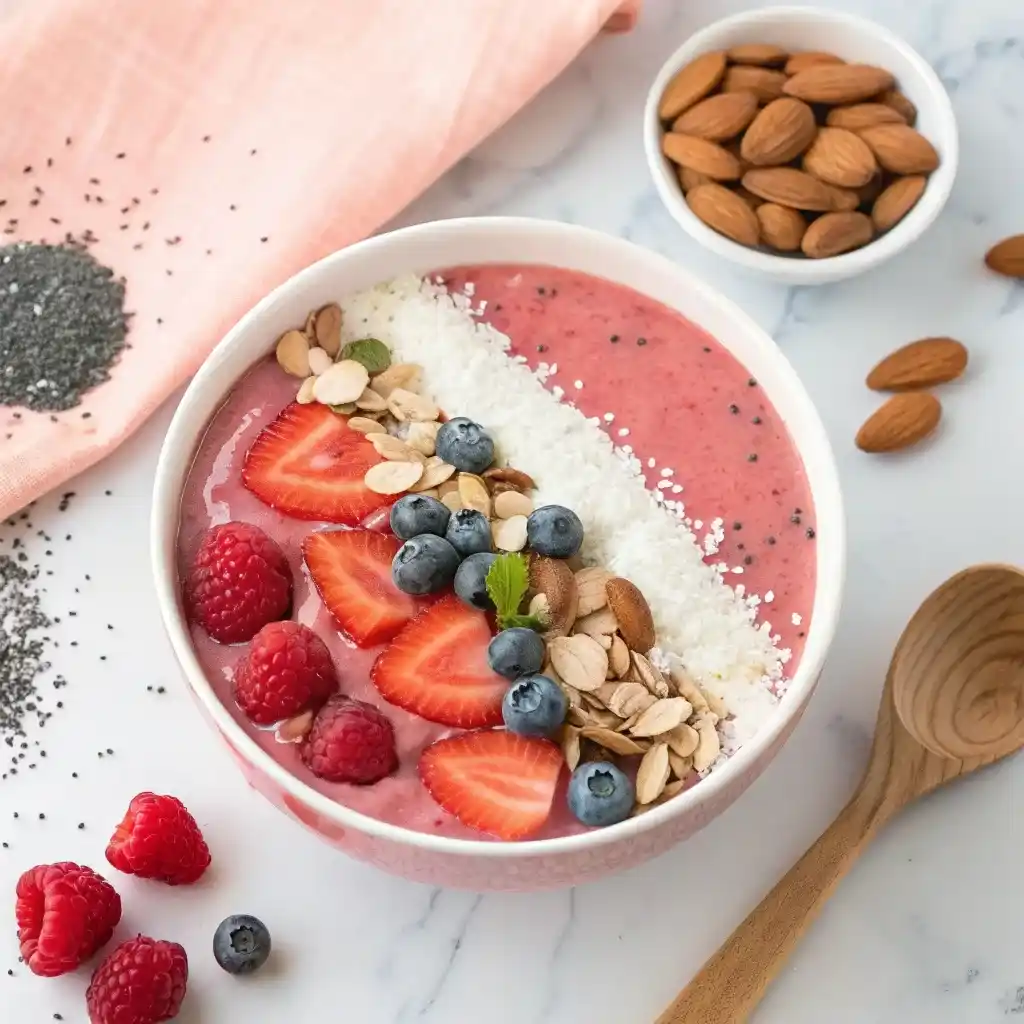
Ingredients:
- 2 cups frozen watermelon chunks
- 1 scoop vanilla protein powder (whey or plant-based)
- 1/2 frozen banana
- 1 tbsp almond butter
- 1/2 cup unsweetened almond milk
- 1 tbsp chia seeds
- 1 tbsp coconut flakes
- 1/4 cup fresh berries
- 1 tbsp chopped almonds
Instructions:
- Blend frozen watermelon, protein powder, banana, almond butter, and almond milk until smooth
- Pour into a bowl and top with chia seeds, coconut flakes, berries, and almonds
- Enjoy immediately while cold
Nutritional Benefits: With 25g of protein per serving, this smoothie bowl supports muscle maintenance while providing healthy fats from almond butter and omega-3 fatty acids from chia seeds. The fiber content helps stabilize blood sugar levels and promotes digestive health.
3. Watermelon Gazpacho with Shrimp
This savory soup showcases watermelon’s versatility while providing lean protein and vegetables for a complete, satisfying meal.
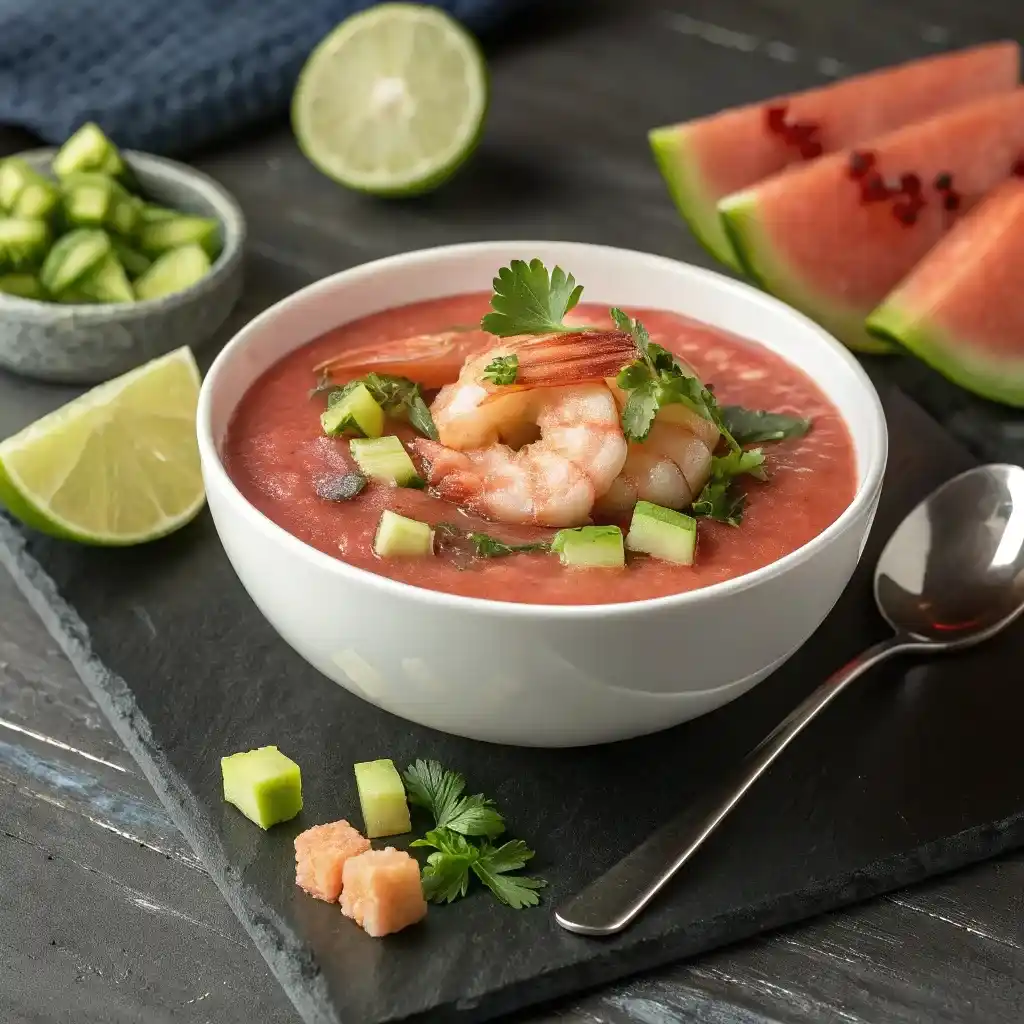
Ingredients:
- 4 cups cubed watermelon
- 1 cucumber, peeled and diced
- 1/2 red bell pepper, diced
- 1/4 red onion, minced
- 2 tbsp fresh lime juice
- 1 tbsp olive oil
- 1/2 tsp salt
- 1/4 tsp cumin
- 1 lb cooked shrimp, peeled
- 1/4 cup fresh cilantro
- 1 avocado, diced
Instructions:
- Blend 3 cups watermelon, half the cucumber, lime juice, olive oil, salt, and cumin until smooth
- Stir in remaining watermelon, cucumber, bell pepper, and onion
- Chill for at least 2 hours
- Serve topped with shrimp, cilantro, and avocado
Nutritional Benefits: This gazpacho delivers 30g of lean protein per serving from shrimp, plus healthy monounsaturated fats from avocado. The vegetables provide additional fiber and antioxidants, while the cool temperature makes it perfect for hot summer days.
4. Grilled Chicken and Watermelon Lettuce Wraps
These fresh wraps combine lean protein with watermelon’s natural sweetness for a light yet satisfying meal.
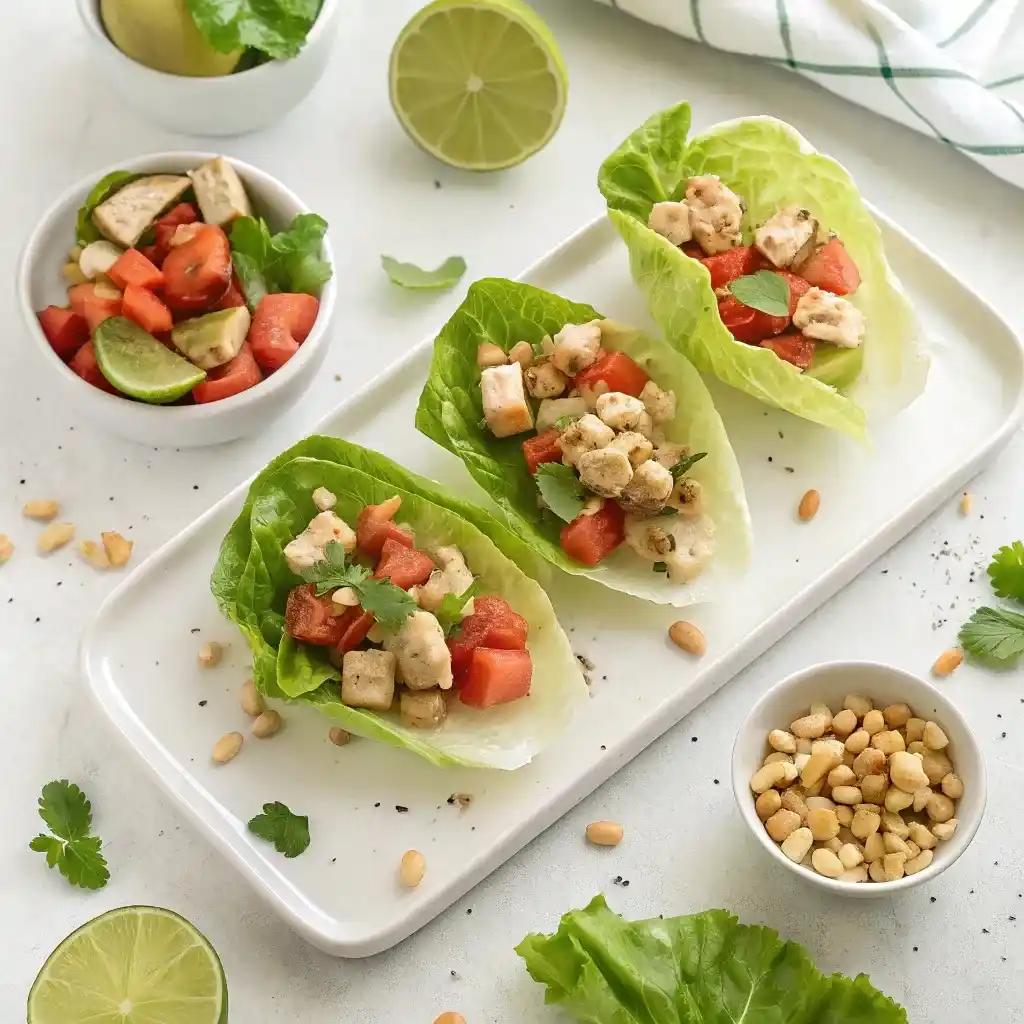
Ingredients:
- 1 lb grilled chicken breast, diced
- 2 cups watermelon, diced small
- 1/2 cucumber, diced
- 1/4 cup red onion, minced
- 2 tbsp fresh mint, chopped
- 2 tbsp lime juice
- 1 tbsp olive oil
- 1/2 tsp salt
- 8 large butter lettuce leaves
- 1/4 cup chopped peanuts
Instructions:
- Combine chicken, watermelon, cucumber, onion, and mint in a bowl
- Whisk together lime juice, olive oil, and salt
- Toss chicken mixture with dressing
- Spoon filling into lettuce leaves
- Top with chopped peanuts and serve immediately
Nutritional Benefits: Each wrap provides approximately 25g of complete protein from chicken, plus healthy fats from peanuts. The lettuce wraps keep carbohydrates moderate while providing satisfying crunch and freshness.
Sustainable Weight Loss: What Actually Works
Rather than falling for quick-fix trends like the watermelon diet, focus on evidence-based strategies that support long-term success and overall health.
The Foundation of Sustainable Weight Loss
Create a Moderate Caloric Deficit: Aim for 300-500 calories below your maintenance level. This allows for steady 1-2 pound weekly weight loss while preserving muscle mass and metabolic function.
Prioritize Protein: Include 20-30g of complete protein at each meal to support muscle maintenance, increase satiety, and boost metabolic rate through the thermic effect of food.
Embrace Healthy Fats: Include sources like avocados, nuts, seeds, and olive oil to support hormone production and nutrient absorption while enhancing meal satisfaction.
Focus on Fiber: Aim for 25-35g daily from vegetables, fruits, whole grains, and legumes to support digestive health and blood sugar stability.
Need meal planning inspiration? My 7-day weight loss meal prep plan shows you exactly how to build balanced, satisfying meals that support your goals.
How to Include Watermelon in a Balanced Diet
Watermelon absolutely has a place in healthy eating when consumed as part of a varied, nutrient-dense diet. Here’s how to enjoy it wisely:
Pair with Protein: Always combine watermelon with a protein source to slow sugar absorption and increase satiety.
Mind Your Portions: Stick to 1-2 cups per serving to avoid excessive sugar intake.
Time It Right: Enjoy watermelon post-workout when your body can efficiently utilize the natural sugars for muscle recovery.
Enhance with Healthy Fats: Add nuts, seeds, or a drizzle of olive oil to boost nutritional value and satisfaction.
Stay Hydrated: Use watermelon as one component of your hydration strategy, not your only source of fluids.
Your Next Steps Toward Lasting Health
The watermelon diet might promise quick results, but sustainable weight management is about creating healthy habits that you can maintain for life. Instead of restricting yourself to a single food, focus on building a varied, nutrient-dense eating pattern that includes the foods you love – watermelon included.
Ready to start your journey toward sustainable health? Try one of the four watermelon recipes I’ve shared above this week. Each one provides complete nutrition while showcasing how delicious healthy eating can be. Your body – and your taste buds – will thank you for choosing nourishment over restriction.
Remember: the best diet is one you can follow for life, not just for a few days. Choose progress over perfection, and watch as small, consistent changes lead to lasting transformation.
Ready to explore more sustainable approaches to wellness? Browse my collection of safe, effective weight loss drinks that actually support your health journey.
Print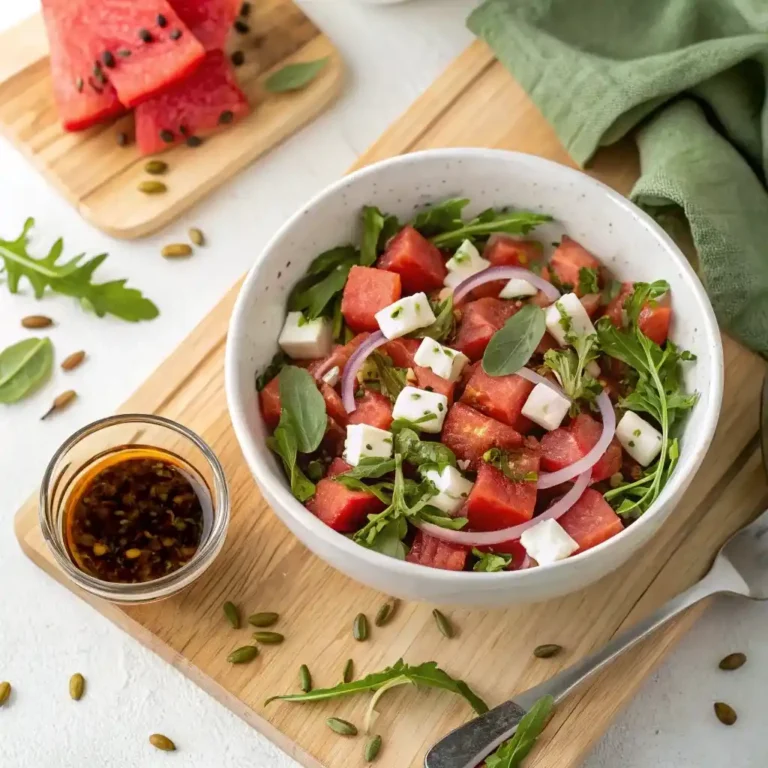
Protein-Packed Watermelon Feta Salad
A refreshing Mediterranean-inspired salad that combines sweet watermelon, savory feta, and crunchy pumpkin seeds for a balanced, protein-rich summer dish.
- Total Time: 15 minutes
- Yield: 4 servings 1x
Ingredients
- 4 cups cubed watermelon
- 6 oz feta cheese, crumbled
- 2 cups arugula
- 1/4 cup red onion, thinly sliced
- 1/4 cup fresh mint leaves
- 1/4 cup pumpkin seeds
- 2 tbsp extra virgin olive oil
- 1 tbsp balsamic vinegar
- 1/4 tsp black pepper
Instructions
- Combine watermelon, feta, arugula, red onion, and mint in a large bowl.
- Whisk together olive oil and balsamic vinegar.
- Drizzle dressing over salad and toss gently.
- Top with pumpkin seeds and black pepper.
- Serve immediately for best texture.
Notes
For best flavor, use chilled watermelon and high-quality extra virgin olive oil.
- Prep Time: 15 minutes
- Cook Time: 0 minutes
- Category: Salad
- Method: No Cook
- Cuisine: Mediterranean
- Diet: Vegetarian
Nutrition
- Serving Size: 1 serving
- Calories: 250
- Sugar: 10g
- Sodium: 400mg
- Fat: 16g
- Saturated Fat: 6g
- Unsaturated Fat: 9g
- Trans Fat: 0g
- Carbohydrates: 18g
- Fiber: 2g
- Protein: 8g
- Cholesterol: 25mg
Keywords: watermelon, feta, salad, summer recipe, healthy, protein-packed

